

What are Cognitive Skills and Abilities? By: Dr.
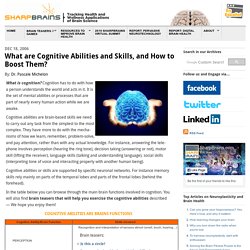
Pascale Michelon What is cognition? Cognition has to do with how a person understands the world and acts in it. It is the set of mental abilities or processes that are part of nearly every human action while we are awake. Cognitive abilities are brain-based skills we need to carry out any task from the simplest to the most complex. Cognitive abilities or skills are supported by specific neuronal networks. In the table below you can browse through the main brain functions involved in cognition.
LearningRx Brain Training Center. Cognitive skills are the core skills your brain uses to think, read, learn, remember, reason, and pay attention.
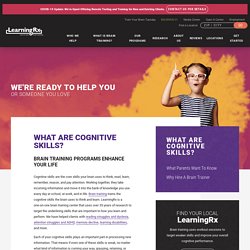
Working together, they take incoming information and move it into the bank of knowledge you use every day at school, at work, and in life. Brain training trains the cognitive skills the brain uses to think and learn. LearningRx is a one-on-one brain training center that uses over 35 years of research to target the underlining skills that are important to how you learn and perform. What are Cognitive Skills? Cognitive skills are the skills and abilities for thinking that we develop from early childhood through to old age.
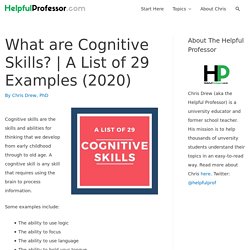
A cognitive skill is any skill that requires using the brain to process information. Some examples include: (2) What Are Cognitive Skills and How Do They Work? - A BrainFit Resorts Production. Regular exercise changes the brain to improve memory, thinking skills.
There are plenty of good reasons to be physically active.
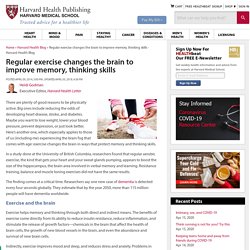
Big ones include reducing the odds of developing heart disease, stroke, and diabetes. Maybe you want to lose weight, lower your blood pressure, prevent depression, or just look better. Here’s another one, which especially applies to those of us (including me) experiencing the brain fog that comes with age: exercise changes the brain in ways that protect memory and thinking skills.
In a study done at the University of British Columbia, researchers found that regular aerobic exercise, the kind that gets your heart and your sweat glands pumping, appears to boost the size of the hippocampus, the brain area involved in verbal memory and learning. Resistance training, balance and muscle toning exercises did not have the same results.
The finding comes at a critical time. What are the Benefits of Staying Active? (with pictures) Improving Memory: Understanding age-related memory loss. Memory-training techniques Age can dull the ability to remember things.
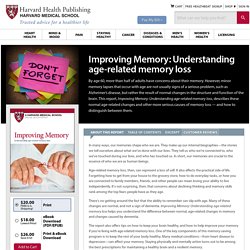
This is often the result of normal changes in the structure and function of the brain, and isn't dementia, Alzheimer's disease, or other brain problem. If you have normal age-related memory loss, several techniques can help you improve your ability to retain new information and skills. Mnemonics You've probably heard stories about people with extraordinary memories and wondered how they do it. Staying Active May Help Prevent Dementia - MedicineNet. MONDAY, July 14, 2014 (HealthDay News) -- Being physically active in middle age appears to help reduce your risk for Alzheimer's disease and other types of dementia, suggest the findings from two new studies.
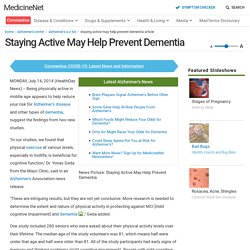
"In our studies, we found that physical exercise at various levels, especially in midlife, is beneficial for cognitive function," Dr. Yonas Geda from the Mayo Clinic, said in an Alzheimer's Association news release. "These are intriguing results, but they are not yet conclusive. More research is needed to determine the extent and nature of physical activity in protecting against MCI [mild cognitive impairment] and dementia," Geda added. One study included 280 seniors who were asked about their physical activity levels over their lifetime. After about three years, the researchers found that people with a history of moderate physical activity in middle age had a significantly decreased risk of developing dementia. -- Robert Preidt Copyright © 2014 HealthDay. References -- Robert Preidt.
3 Easy Ways To Be An Active Senior. The Health Promotion Board (HPB) recommends that everyone engages in an active lifestyle to promote and prolong good health <div class="ExternalClass45DC71FC7DAE46489DFD5D00EC9ED88D"><h1>Tips for Being a Physically Active Senior</h1><p><em>Source: The Straits Times, 25 July 2016 © Singapore Press Holdings Limited.
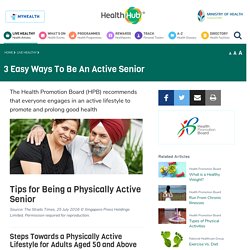
Permission required for reproduction. </em></p><hr /><h2>Steps Towards a Physically Active Lifestyle for Adults Aged 50 and Above</h2><h3>1. Active ageing programmes. Staying active in later life. Benefits of staying active Physical activity can lower your risk of developing - or help you manage - many chronic health conditions, including coronary heart disease, stroke, Type 2 diabetes, some types of cancer, obesity and arthritis.
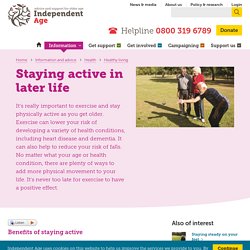
It can also reduce the risk of depression, dementia and Alzheimer’s disease. Exercise is also good for your mental wellbeing. It can: improve your moodincrease self-esteemgive a sense of achievementhelp you relaxrelieve stress. Ageing Well: 5 Essential Health Tips for the Elderly. 5 Golden Rules to Prevent Dementia. According to a nationwide study in 2015, 1 in 10 Singaporeans aged 60 and above had dementia.
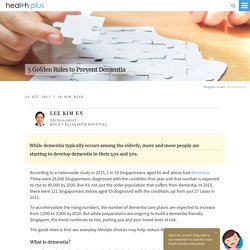
There were 28,000 Singaporeans diagnosed with the condition that year and that number is expected to rise to 80,000 by 2030. But it’s not just the older population that suffers from dementia. In 2015, there were 121 Singaporeans below aged 65 diagnosed with the condition, up from just 27 cases in 2011. People's Association. Senior Citizens' Executive Committees PA Senior Citizens’ Executive Committees (SCECs) is the largest seniors’ network in Singapore.
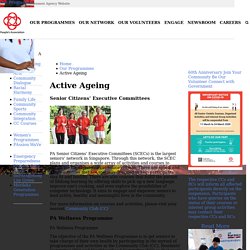
Through this network, the SCEC plans and organises a wide array of activities and courses to enrich the life experiences of senior citizens.